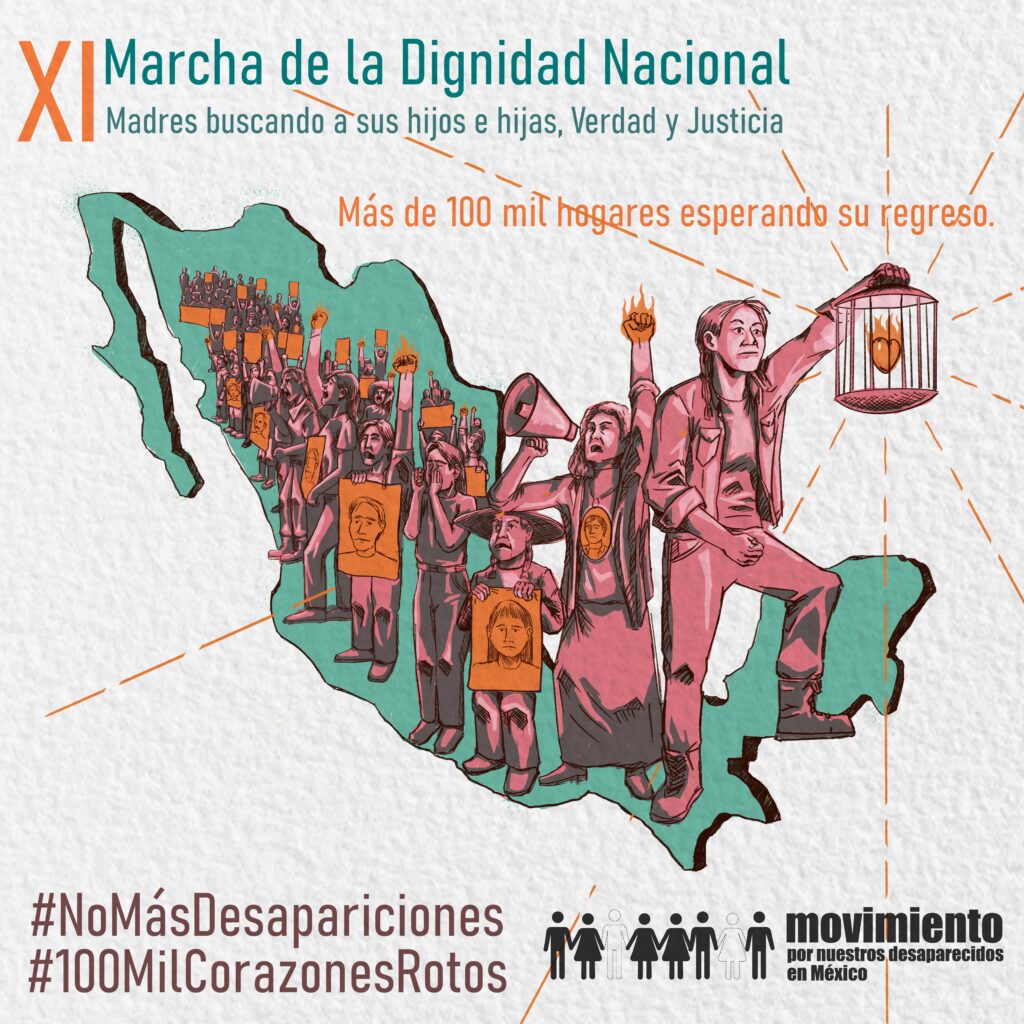Sorry, this entry is only available in Español. For the sake of viewer convenience, the content is shown below in the alternative language. You may click the link to switch the active language.
PRONUNCIAMIENTO
XI Marcha de la Dignidad Nacional
Madres Buscando a sus Hijos e Hijas, Verdad y Justicia
¿Quién te buscará cuando yo ya no esté?
El gran fracaso del Estado Mexicano,
es no encontrar a nuestros seres queridos desaparecidos

México, 10 de mayo del 2022
¿Cuántas madres, padres, abuelitas, abuelitos, hermanas, hermanos y demás familiares han fallecido en la exigencia de localizar a su familiar, y lograr llegar a la verdad, a la justicia y a la reparación del daño? ¿Acaso el Estado Mexicano le apuesta a que nosotras ya no estemos para que nadie más les busque? ¿Qué maquiavélico plan tienen en la cabeza que sólo piensan en administrar nuestro dolor, cansarnos, desgastarnos y no hacer nada para tener de regreso a nuestros seres queridos desaparecidos?
Este 10 de mayo del 2022 que quede registrado en la historia:
Señor presidente Andrés Manuel López Obrador
Señor fiscal general de la República Alejandro Gerz Manero
Señor Subsecretario de Derechos Humanos, Población y Migración Alejandro Encinas Rodríguez
Señora Comisionada Nacional de Búsqueda Karla Quintana Osuna
Señora Martha Yuriria Rodríguez Estrada, titular de la Comisión Ejecutiva de Atención a Víctimas
Señora María del Rosario Piedra Ibarra, titular de la Comisión Nacional de los Derechos Humanos
Señores gobernadores y señoras gobernadoras
Señores senadores, señoras senadoras de distintos partidos políticos
Señores diputados, señoras diputadas de distintos partidos políticos
Su tarea principal al asumir la labor que desempeñan es ser cuidadores y cuidadoras de su pueblo, es proteger y garantizar los derechos fundamentales de las personas, entre ellos y, el más importante, la vida. Sin embargo, ustedes nos han fallado después de que pusimos nuestra confianza al elegirlos. Ustedes nos fallaron cuando permitieron que nos desaparecieran a quienes más amamos: a nuestros hijos, a nuestras hijas, madres, padres, esposas, esposos, hermanos, hermanas. Ustedes como ayer y hoy son cómplices al permitir que siga habiendo desapariciones y, sobre todo, al seguir permitiendo que esta tragedia humanitaria envuelva a todo el país. Desde nuestra primera marcha les advertimos lo que pasaba en el norte del país y les exigimos pararan esta tragedia y no nos hicieron caso. Hoy nos enfrentamos a las casi 100 mil personas desaparecidas y lo más cruel, a más de 52 mil cuerpos sin identificar que resguardan los SEMEFOS sin condiciones para regresarles a casa; con una alta probabilidad de que sean nuestros seres queridos desaparecidos.
Si no han cumplido su tarea ¿Para qué queremos unos gobernantes que no gobiernan? ¿Para qué queremos unas instituciones de justicia si no otorgan justicia? Si no pueden conducir a un pueblo, ¿Para qué están? No queremos Fiscalías que no sirvan, Comisiones de Búsqueda sin planes que lleven a la localización. Ya no podemos más y es necesario actuar con acciones que den resultados efectivos.
El Comité contra las Desapariciones Forzadas de la ONU emitió unas recomendaciones que deben acatar por ser Estado parte; hay casos concretos donde tienen recomendaciones y no las han cumplido. ¿Qué se necesita para hacerlo? Se obra con total impunidad cubriéndose las espaldas unos con otros mientras el pueblo se muere en la exigencia.
Señores y señoras que gobiernan a nuestro querido país: Nos crearon un infierno y las consecuencias ya las vivimos en todo el país; ya existen desapariciones en todos los estados y la violencia se apodera sin sentido en cada rincón de este nuestro amado México. Ustedes son los únicos culpables por no haber actuado a tiempo.
Quienes estamos en este emblemático Ángel de la Independencia les decimos:
¡Basta de impunidad!
¡Queremos a nuestros seres queridos desaparecidos de regreso!
No tenemos nada que celebrar
¡Hasta encontrarles!
¡Porque vivos les llevaron, vivos les queremos!
CONVOCANTES
Fuerzas Unidas por Nuestros Desaparecidos en Coahuila y en México (FUUNDEC-FUNDEM); Fuerzas Unidas por Nuestros Desaparecidos en Nuevo León (FUNDENL); Desaparecidos Justicia de Querétaro, A. C. y Colectivo de Familias de Guanajuato. RED VERDAD Y JUSTICIA: Comité de Familiares de Migrantes Fallecidos y Desaparecidos del Progreso (COFAMIPRO) Honduras, Comité de Familiares de Migrantes Fallecidos y Desaparecidos (COFAMIDE) El Salvador; Comité de Familiares Migrantes del Centro de Honduras (COFAMICENH); Comité de Familiares de Migrantes Desaparecidos de Guatemala (COFAMIDEG), Familiares acompañados por el Centro de Derechos Humanos de las Mujeres (CEDEHM) (Chihuahua); Hijos por la Identidad y la Justicia contra el Olvido y el Silencio H.I.J.O.S. MÉXICO; Fundación para la Justicia y el Estado Democrático de Derecho; Centro de Derechos Humanos de las Mujeres (CEDEHM) Chihuahua; Centro de Derechos Humanos Victoria Diez en Guanajuato; Centro para los Derechos Humanos Fray Juan de Larios en Saltillo; Casa del Migrante Saltillo; Centro de Derechos Humanos Paso del Norte en Ciudad Juárez; Mexicanos en el Exilio; Comisión de Solidaridad y Defensa de los Derechos Humanos, A. C. (COSYDDHAC); Familias Unidas por la Verdad y la Justicia (Chihuahua); Familias Unidas en la Búsqueda y Localización de Personas Desaparecidas, A. C. (Coahuila); Red Fronteriza por los Derechos Humanos (Texas y Nuevo México); Buscando Desaparecidos México (BÚSCAME); Siguiendo Tus Pasos (Ensenada, B.C.); Colectivo 21 de Mayo (Tamaulipas); Red de Madres Buscando a sus Hijos; Familias Unidas en Búsqueda y Localización de Personas Desaparecidas; Campaña Nacional contra la Desaparición Forzada en México; Comité de Familiares Detenidos Desaparecidos “Hasta Encontrarlos”; Fundación Lucero de América; Justicia para Nuestras Hijas; Asociación de Familiares de Detenidos Desaparecidos y Víctimas de Violaciones a los Derechos Humanos en México AFADEM –FEDEFAM (Guerrero); Agrupación de Mujeres Organizadas por los Ejecutados, Secuestrados y Desaparecidos de Nuevo León (AMORES), Nuevo León; Unidos por los Desaparecidos de Baja California, A. C.; Buscando a Nuestros Desaparecidos y Desaparecidas Veracruz; Colectivo por la Paz Xalapa (Veracruz); Colectivo Colibrí (Estado de México); Colectivo Solecito de Veracruz; Comité de Familiares de Personas Desaparecidas en México, “Alzando Voces” COFADDEM (Michoacán); Comité-Familias Unidas de Chiapas Buscando a Nuestros Migrantes “Junax Ko’otontik” (Chiapas); Deudos y Defensores por la Dignidad de Nuestros Desaparecidos; Colectivo Familias de Desaparecidos Orizaba – Córdoba (Veracruz); Familiares en Búsqueda María Herrera, A.C (Distrito Federal, Poza Rica, Veracruz, (Tlapacoya); Familias Unidas por Nuestros Desaparecidos Jalisco (FUNDEJ); Familiares Enlaces Xalapa (Veracruz); Frente de Víctimas del Estado de Morelos (Morelos); Víctimas por sus Derechos en Acción (Grupo VI.D.A. Laguna A.C.); Justicia para Nuestras Hijas (Chihuahua); Los Otros Desaparecidos de Iguala (Guerrero); Colectivo Madres Unidas (Chihuahua); Plataforma de Víctimas de Desaparición en México (Distrito Federal); Por Amor a Ellxs (Jalisco); Red de Madres Buscando a sus Hijos, A.C.; Red Nacional de Enlaces; Regresando a Casa Morelos; Unión de Madres con Hijos Desaparecidos de Sinaloa; Víctimas y Ofendidos del Estado de Morelos, A.C.; Voces Unidas por la Vida, (Culiacán, Sinaloa); Buscadoras de El Fuerte y Zona Norte (Sinaloa); Comité de Familiares y Amigos de Secuestrados, Desaparecidos y Asesinados en Guerrero; Colectivo de Familiares y Amigos Desaparecidos en Tamaulipas; Asociación Internacional de Búsqueda de Desaparecidos en México (Coahuila); Familiares Acompañados por el Centro para el Desarrollo de la Mujer (CEDIMAC) (Chihuahua); Sabuesos Guerreras, A. C. (Sinaloa y Ext. Oaxaca2); Voz que Clama Justicia por Personas Desaparecidas (Coahuila); Familias Unidas en Busca de una Esperanza (Zacatecas); Madres en Búsqueda Coatzacoalcos; Guerreras Buscadoras de Sonora; Oaxaqueños Unidos Exigimos Justicia; Uniendo Esperanzas Estado de México; Alondras Unidas en Búsqueda Belén González; Búsqueda Colectiva Coatzacoalcos zona sur; Guerreras en Búsqueda de Nuestros Tesoros (Nayarit); Familias Unidas por la Verdad y la Justicia (Ciudad Juárez, Chihuahua); Las Rastreadoras del Fuerte (Sinaloa; Buscadores Fe y Esperanza (Sinaloa); Mariposas Destellando Buscando Corazones y Justicia (Estado de México, CDMX, Guanajuato, Nayarit); Guerreras Buscadoras de Sonora; Guerreras Buscadoras de Cajeme; Unidas Siempre Buscando Firma; Unión de Madres con Hijos Desaparecidos Sinaloa Años 70s; Amor, Esperanza y Lucha Zacatecas; Colectivo Unidos por la Paz (Veracruz); Juntos por Hidalgo; Juntos por Quintana Roo; Buscadores de Sueños y Esperanza; Todos somos Iguales (CDMX); Buscando Corazones Perdidos (Xalapa); Buscadoras de Nuevo León; Unidas por el dolor (Culiacán, Sin.); Grupo Civil de Búsqueda, AC; Colectivo Pirasol de Cd. Valles; Madres Igualtecas en busca de sus Desaparecidos; Colectivo por la Paz Xalapa, AC; Sara González Rodríguez; Rastreador@s Nacionales de Desaparecidos (RANADES); Grupo de Acción por los Derechos Humanos y la Justicia Social; Unidas por Amor a Nuestros Desaparecidos Poza Rica; Unidos por la Paz Veracruz; Voz de los Desaparecidos en Puebla; Diez de Octubre (Parral, Chih.) Madres y padres de los 43; Familiares Caminando por Justicia (Michoacán); Buscándote con Amor Estado de México; Red Regional de Familias Migrantes CA; Familias Unidas por una Causa A.C; Grupo Esposas y Familiares de Agentes de Seguridad Desaparecidos por Militares en 1977; Una Luz en el Camino (CDMX); Armadillos Rastreadores Ensenada; Unión de Familias Resilientes buscando a sus Corazones Desaparecidos Morelos; Unidas Siempre Buscando (USB); Oaxaqueños Buscando a los Nuestros, A.C; Uniendo Cristales, A.C; Buscando te Encontraré, A.C. de Cd. Victoria, Tamaulipas; Hasta Encontrarlos CDMX; Buscando el camino hacia Encontrarlos Tamaulipas México, A.C; Juntas y Unidas Seremos más Fuertes Guerrero; Colectivo de Desaparecidos Lupita Rodríguez Narcizo; Ángeles de Pie por Ti; Invisibles México; Familias de Acapulco en Busca de sus Desaparecidos AC; Colectivo Justicia y Esperanza; Rastreadoras por la Paz; Jóvenes Buscadores de Ahome; Sin Ellos No; Rastreadores Independientes de Culiacán, Sinaloa.
ORGANIZACIONES CIVILES, ACADEMIA, ACOMPAÑANTES y SOLIDARIAS
Comité Cerezo México; Movimiento por la Paz con Justicia y Dignidad; Centro de Derechos Humanos Fray Bartolomé de las Casas; Libera Asociaciones, Nombres, Números contra la Mafia (Italia); Casa Xitla; Solidaria Consultora, FUNDAR Centro de Análisis e Investigación; Nuestra Aparente Rendición; Servicios y Asesoría por la Paz (SERAPAZ); América Latina Alternativa Social (ALAS) integrado por 11 países: México, Guatemala, Bolivia, El Salvador, Colombia, Argentina, Brasil, Ecuador, Honduras, Nicaragua y Perú; Cauce Ciudadano A. C.; Red Retoño para la prevención social de la delincuencia organizada; Espacio Libre Independiente Marabunta A.C.; Centro de Derechos Humanos de la Montaña Tlachinollan; Comité Monseñor Óscar Romero; Centro de Justicia para la Paz y el Desarrollo, A.C. (CEPAD); Taller de Desarrollo Comunitario A. C.; Comisión Mexicana de la Defensa y Promoción de los Derechos Humanos (CMDPDH); Centro de Capacitación Integral y Desarrollo Integral de la Familia AC; Centro para el Desarrollo Integral de la Mujer, A.C. (CEDIMAC) (Chihuahua); Colectivo Huellas de la Memoria; Instituto Mexicano de Derechos Humanos y Democracia, AC; Instituto de Investigación y Práctica Social y Cultural; Centro de Derechos Humanos “Miguel Agustín Pro Juárez”, A. C.; Red Nacional de Organismos Civiles Todos los Derechos para Todas y Todos (Red TDT); Amnistía Internacional México; Consultores por la Paz; Licenciatura en Derecho de la Universidad Iberoamericana Torreón; Observatorio Sobre Desaparición e Impunidad en México; Karina Ansolabehere, investigadora IIJ -UNAM/ FLACSO-México; Red Latinoamericana contra la Desaparición Forzada (Integrada por colectivos y ONGs de Colombia, Guatemala, Honduras, El Salvador, Argentina y México); Solidaria Consultora; Litigio Estratégico en Derechos Humanos A.C (IDHEAS); Voz con Dignidad y Justicia México, A.C.; Red Fronteriza por los Derechos Humanos (Texas y Nuevo México de EU); Grupo de Investigaciones en Antropología Social y Forense (GIASF); Albergue Tochan-Nuestra Casa; Coordinadora Nacional de Mujeres Indígenas (CONAMI México).







